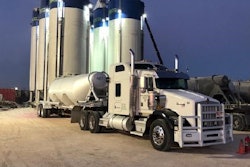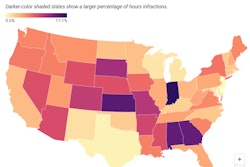From the advent of the Federal Motor Carrier Safety Administration’s CSA Safety Measurement System in 2010, its shortcomings were well-evident to carriers and baked into its structure. At that time, carriers were focused on scoring inequities, particularly when comparing the way a small carrier's scores moved wildly, because of very little data input to average, versus the slow climbs and falls with more data on the large-carrier side.
There's since been refinement of a feeling among critics that the very public nature of the data underpinning what passes for CSA today is its fatal design flaw, creating far too many "unintended consequences," in the words of Payne Trucking Safety Director Chris Haney. Those consequences have been, at best, unfair to carriers forced to contend with them on a daily basis.
That’s inclusive of small fleets and owner-operators, and company drivers to an extent, too, given the increased importance of every violation you could possibly think of.
[Related: Ticket challenges, courtroom crash drama, DataQs hurdles: Video's power for clear communication]
For today's edition of Overdrive Radio, we're turning back to my February discussion with Haney and CVSA data director Chris Turner, formerly of the Kansas Highway Patrol. We're highlighting various aspects of the discussion, including Haney's view that despite efforts to better contextualize publicly available data, too many of those unintended consequences continue to be big problems for carriers. The entire trucking, enforcement and regulator community should do a lot better, both he and Turner contend, working together to counteract the issues. Take a listen:
I came back to that discussion for another reason, too. I heard earlier this week from Eagle Express small fleet owner Leander Richmond about yet another DataQs outcome that went in his favor. DataQs, regular readers will know, is the system through which carriers can try to correct information collected about them by states in partnership with FMCSA – violations needing challenging, citations that have been adjudicated, incorrect crash information or disputes over crash reportability, and more.

[Related: False log! Or: Another name for ‘7.2 miles South of Chaparral, N.M.’]
Small fleet owner Richmond finally resolved a false-log violation case involving one of his drivers down in New Mexico that I wrote about in October 2019. Early October, mind you. He finally got to the right person through a letter to the New Mexico attorney general and those in state law enforcement with awareness of the case and, finally, someone listened. The false-log violation will be removed from his record in July, he was told.
That's a whopping 20-plus months after the original issuing. Another four months and Richmond would have been free and clear of the violation on his record just by natural timing, had he done nothing at all to challenge it. His last DataQs success was late last year – that violation took more than a year to be argued over and removed as well. This latest small victory means that, of violations sitting on his record right now, he’s actually challenged and removed the equivalent of about 15 percent in just a couple years.
[Related: Red tape, deaf ears: Criticism mounts of DataQs crash- and inspection-info review system]
Those time lags, however, make carriers increasingly feel like they are more victims of the process than a part of it, as Haney put it.
Here's Richmond's take: “This battle has gone on for 20 months. In July, it comes off our CSA score. So we have renewed our insurance twice, in 2020 and this month, with the negative financial impact of a false log.” How many other carriers out there have had the same on their record?
The time lag subject, and plenty tips toward speeding things up, was also a big part of the long DataQs discussion with Haney and Turner presented in this week's podcast.










